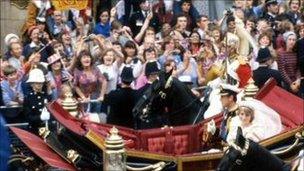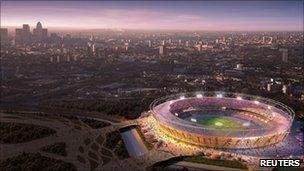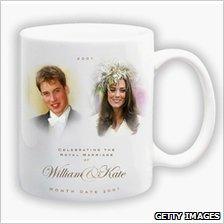UK economy set for royal wedding feel-good factor
- Published

A royal wedding can create a sense of wellbeing in the middle of an economic downturn
Next year's royal wedding is set to give the UK economy a boost, with tourism, merchandising and broadcasting among the best placed sectors.
Restaurateurs and hoteliers can now look forwards to a two year bulge in tourism numbers, with the 2011 wedding to be followed by the 2012 Olympics.
Meanwhile media companies can expect exceptional viewing figures.
And some economists think that a feel-good event could help lift broader consumer spending out of the doldrums.
Spending boost
"Extraneous events can increase feelings of economic and other wellbeing," says Professor Stephen Lea of Exeter University, who specialises in economic psychology.
While many consumers have been directly affected by the recession, or fear they will be, he says there is also a large group of people who are merely affected by the atmosphere of doom and gloom.
These people - who may have experienced better circumstances this year and anticipate better circumstances next year - still tend to rein in their spending with others during the recession.
But if the wedding sparks a feel-good factor, he thinks many in this group may choose to increase their discretionary spending on electronics goods, home improvements and other things that might otherwise be postponed.
"The great advantage is that generally these people are not borrowing, but spending out of savings or increased income," he adds.
'Halo effect'
A more tangible benefit to the UK economy could come from tourism.

Will the wedding compete with or complement the Olympics for tourist numbers?
According to recent research by tourism board Visit Britain, external, the attraction of royalty already accounts for £500m in tourist spending each year in normal times.
"Our culture and heritage reputation is very strong around the world," says Visit Britain spokesman Paul Eastham. "At the heart of that lies the monarchy."
He notes that in 1981, Charles and Diana's wedding was cited as the reason tourists were most likely to visit the UK.
International viewing figures for the television broadcast of Charles and Diana's wedding were estimated at over 750 million.
"People like to be on the spot when historic events happen," he adds, saying the coming wedding is "likely to produce a very positive additional premium on what we normally see".
He also brushes off any concern that the 2011 wedding may sap tourist numbers for the 2012 Olympics.
"From our point of view it's almost ideal," he says, claiming there would be a "halo effect" for the UK of showcasing its two tourism strengths: pomp and circumstance followed by a hi-tech sporting event.
Christmas gifts
The timing of the announcement is good news for retailers specialising in Royal commemorative items, who expect to have a range of products available in time for Christmas.
The UK Gift Company, which specialises in Royal items anticipates an upturn in business of about 30% to 40%.

Some retailers like Woolworths slightly jumped the gun
Plates and mugs still lead demand, according to managing director Stephen Church, although he also expects stiff trade in hand painted boxes for trinkets.
He said the leading china houses would produce items ranging in price from more than £1,000 for limited editions to less than £5.
Mr Church added that he was amazed that so many people of different age groups bought such items.
The older generation tended to be most keen, but young men would still be attracted to items such as cufflinks to mark the occasion, he said.
Mug's game
Some William and Kate items have already been produced.
Four years ago, Woolworths was so confident that the couple were to be engaged that it produced a commemorative mug and plate.
The relationship has survived since then, but Woolworths on the High Street has not - with the final stores closing in January 2009.
The longevity of memorabilia is also obvious from the items still on sale on internet auction sites from previous Royal weddings.
A quick glance at what is on offer from Prince William's parents' marriage sees glass bowls on sale for £19.50.
Other items include glasses, a bell, newspaper cuttings from the day, coins, spoons and even a bottle of "wedding ale".